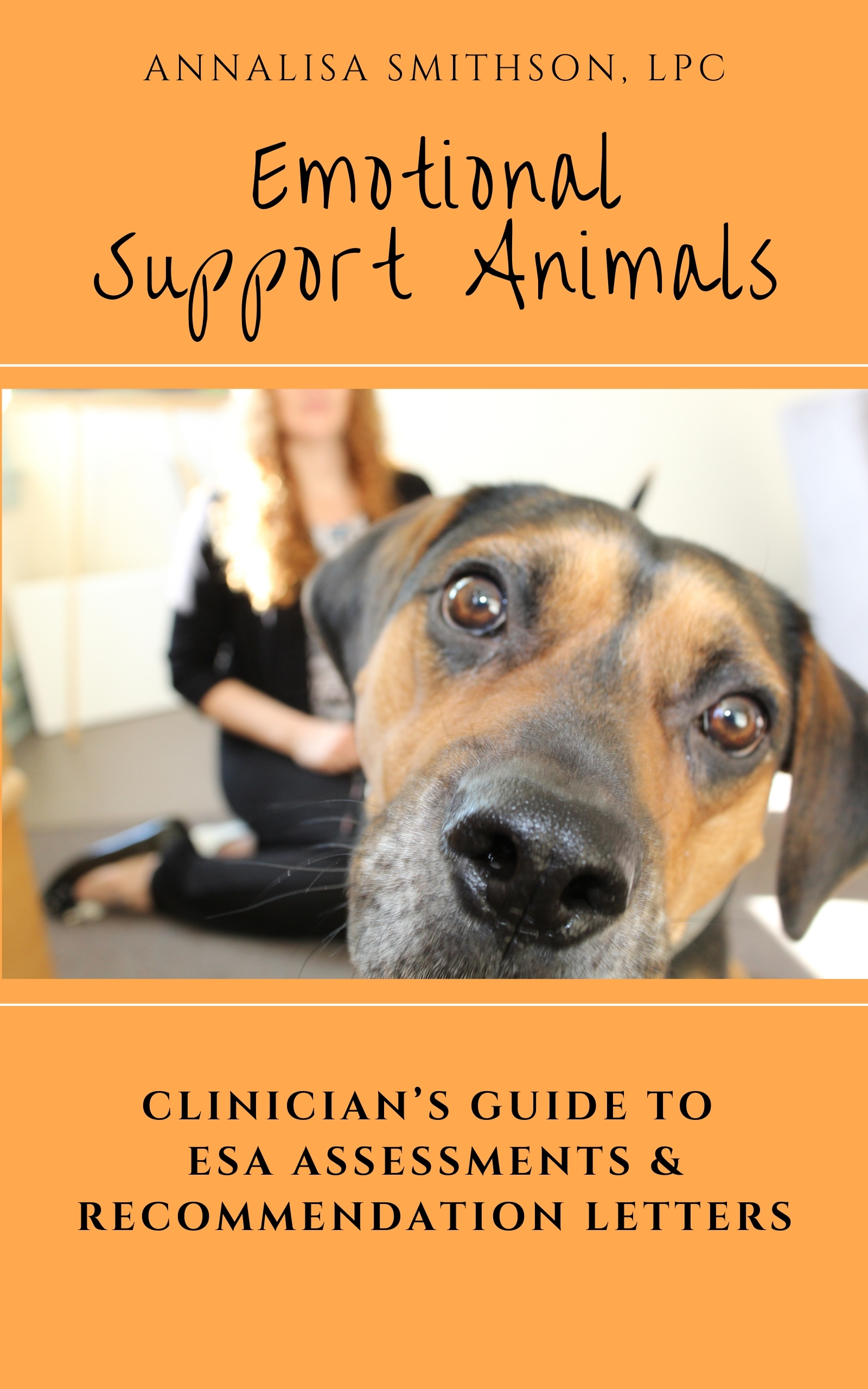Ethics of Emotional Support Animals

As a licensed professional counselor in private practice, I get many calls from hopeful clients asking if I can write them a recommendation letter for an emotional support animal (ESA). The answer is always a tentative, “maybe.” You see, it’s not as simple as filling out a form and paying a fee. There is a careful screening, evaluation, psychoeducation, and follow-up process that must be followed before a therapist can provide that coveted letter. Many of my peers shy away from providing this service because of the misinformation and negative media attention given to emotional support alligators (or goldfish or whatever the headline of the day spouts). In this post, we’re going to explore the ethical implications for clinicians who are considering whether or not to provide ESA assessments and letters. Please share with this with your counselor, social worker, and psychologist friends.
This blog post is an excerpt from Emotional Support Animals: Clinician’s Guide to ESA Assessments and Recommendation Letters by Annalisa Smithson available on Amazon.
Counselors should review the American Counseling Association (ACA) Code of Ethics to familiarize themselves with the specific ethics codes that could apply to Emotional Support Animal (ESA) assessments. Pay close attention to Section A on the counseling relationship, Section C on professional responsibility, and Section E on Evaluation, Assessment, and Interpretation (American Counseling Association, 2014).
You can also look to the ACA to better understand the competencies a counselor must develop to become an animal-assisted therapist (Stewart, Chang, Parker, & Grubbs, 2016). While these competencies are specific to counselors who choose to work with an animal co-therapist, the principles underlying animal-assisted therapy will help you become a better ESA assessor.
Another useful resource is the formal position statement on emotional support animals published by the ACA’s Human-Animal Interventions in Counseling (HAIC) Interest Network (American Counseling Association, 2019). Links to these tools are provided below and will help you build a sturdy framework for ethical practice as you move forward in conducting ESA assessments.[1][2][3]
When making a determination about whether or not to recommend an ESA to a specific client, we must weigh the risks to the client, to the animal, and the public. We should share those risks with our clients, so they, too, can weigh the risks against the benefits. There are also possible risks to us—the clinician—which must factor into our decision about whether or not to offer this service.
The ACA’s human-animal interventions committee (HAIC) explores these risks in detail (2019). They suggest that clients might be risking inadequate treatment for a mental health disorder by relying solely on an ESA—in other words, an emotional support animal is not sufficient treatment for a mental health disorder and we must never give the client the impression that an ESA can take the place of mental health care. Clients may also face physical or emotional injury if the animal is not trained properly and there could be a financial burden to accessing the training. There may also be financial burdens in the ongoing care for the animal, such as vet bills, food, and toys. Clients or members of their household may develop allergies and zoonotic infections. And clients face the risk of potential legal repercussions if they misrepresent an ESA as a service animal. It is also considered a risk to the public when ESAs are misrepresented as service animals. Improperly trained and/or unvaccinated animals pose a public health risk in our communities.
Counselors, too, face some risk in taking on this practice, including liability if working outside their scope of training; potential fraud if the evaluation is not completed ethically and professionally; and the possibility of being called to testify if the ESA is challenged or if an incident occurs.
Finally, it is also our ethical responsibility to consider possible risks to the animal’s physical and mental health if a client is unable to fulfill their responsibilities as an ESA handler.
Ethics Scenario #1
Barry calls your agency and requests an appointment to talk about his depression but does not mention emotional support animals on the phone. During the intake, you diagnose him with major depressive disorder and then he asks you to write a letter to his landlady stating that he needs an emotional support cat for his depression. He tells you he has no insurance, is struggling financially, and will think about therapy but isn’t ready to commit just yet. You have been trained to provide ESA assessments; however, you are not prepared with your material because you didn’t know this intake might include an ESA assessment. Should you:
- Write the ESA letter—after all, he has a specific diagnosis that qualifies him for an ESA.
- Reschedule Barry for later in the day to complete an ESA assessment so you have time to prepare an assessment chart and client resource packet.
- Explain why you cannot write the letter at this time and connect Barry with local resources to help him access insurance and appropriate mental health services.
Using the ACA Ethical Decision-Making model (2014), let’s walk through this scenario together:
Identify the Problem: There are several problems present in this scenario. The clinical issue is that Barry has a mental health diagnosis that requires treatment, but the type of treatment he is requesting is not sufficient for his clinical needs. There is also a two-fold ethical problem here. Because Barry cannot afford therapy, he plans to use the ESA as a surrogate for mental health treatment. He has also not been properly screened or assessed for an ESA at the time of his request.
Apply the ACA Code of Ethics: Can you honor Barry’s request for an ESA letter at this time? Section A.4. states that “Counselors act to avoid harming their clients… and to minimize or to remedy unavoidable or unanticipated harm.” Even if you took the time to complete a formal screening and assessment for Barry and determined that he does, in fact, qualify for an ESA, writing the letter at this time would not be appropriate. Recommending an ESA to a client diagnosed with a mental health disorder, but not recommending comprehensive treatment including behavioral therapy, psychiatric interventions, and medication management, could be dangerous. Barry might believe that his emotional support cat is sufficient to reduce his symptoms of depression, whereas, in reality, untreated depression can lead to significant harm, even suicide. It would be unethical and harmful to give Barry the impression that an ESA is all he needs to treat his depression.
Determine Nature and Dimensions of Dilemma: Whenever in doubt, consult with your colleagues. In talking to another counselor you realize that the principles of autonomy, non-maleficence, and fidelity all apply to this scenario. You want to honor Barry’s autonomy in controlling the direction of his life. He gets to choose whether or not to follow through with mental health treatment for his depression. At the same time, you have an ethical obligation to provide appropriate mental health services. An ESA is not a reasonable treatment tool for Barry at this time. The principle of non-maleficence also applies in Barry’s situation because providing an ESA letter without comprehensive treatment could exacerbate rather than reduce his symptoms of depression. Part of fulfilling our responsibilities as ethical counselors are providing clear and honest information about the process and the limitations of obtaining an ESA letter. Barry’s misinformation that he could obtain an ESA during the intake suggests that the principle of fidelity may also apply.
Generate Potential Courses of Action: The counselor has several options in this scenario. With the information provided, likely, you will not provide an ESA letter. Steps to take this course of action should include compassionately informing Barry of the reasons for this decision and providing alternative options for the treatment of his depression. You might decide to offer him a reduced fee for treatment, refer him to an agency that works with uninsured clients, or schedule a pro-bono session to help him apply for state insurance. You might also complete a formal screening for the ESA assessment so that you can educate Barry on the ESA process, limitations, and likely outcome of moving forward with an assessment. This will protect Barry from contacting a potentially fraudulent online ESA company.
Consider Potential Consequences: The consequence of not providing a letter is that Barry could feel disappointed and disillusioned with counseling. This is why counselors should provide as much education as possible in a compassionate manner.
Evaluate the Selected Course of Action: This course of action is universally applicable, would be appropriate for other clients with situations similar to Barry’s, and we would be comfortable with the public and our peers knowing of this decision.
Implement the course of action and always remember to document your decision.
Ethics Scenario #2
Marlon has been seeing you for weekly counseling for the past 6 months. They have been diagnosed with generalized anxiety disorder and you have consulted with their psychiatrist to confirm that diagnosis and better coordinate care for your client. They have shown progress, but after a recent change in their home environment they report that they are feeling “stuck”. Marlon asks you to write a letter to their new apartment owner stating that their dog provides necessary emotional support for their anxiety. Their psychiatrist agrees that an ESA could be useful. You have read some articles on emotional support animals and the therapeutic value of the human-animal bond; however, you’ve never conducted an assessment before. What should you do?
- Do an online search for an ESA letter template and write one up for your client.
- Advise Marlon’s psychiatrist to write the ESA letter.
- Refer Marlon to a qualified mental health professional with experience in ESA assessments.
While the ACA Ethical Decision-Making Model is a useful tool for those complicated, nuanced ethical scenarios, this situation has very little gray area. Section C.2. of the ACA Code of Ethics clearly states that counselors must practice within their boundaries of competence and should “practice in specialty areas new to them only after appropriate education, training, and supervised experience. While developing skills in new specialty areas, counselors take steps to ensure the competence of their work and protect others from possible harm” (2014). Even though both you and the psychiatrist agree that an ESA would be a good fit for Marlon, it would be unethical to complete the ESA assessment yourself without training. The best course of action is to refer Marlon to an ESA-trained counselor or forensic psychologist for their assessment.
Emotional Support Animals: Clinician’s Guide to ESA Assessments and Recommendation Letters by Annalisa Smithson is available on Amazon (FREE with Kindle Unlimited).
[1] https://www.counseling.org/Resources/aca-code-of-ethics.pdf
[2]https://www.counseling.org/docs/default-source/competencies/animal-assisted-therapy-competencies-june-2016.pdf?sfvrsn=c469472c_14
[3]https://www.unh.edu/sites/default/files/departments/student_accessibility_services_/aca.final_version_esa14556_002.pdf

pharmeasy
Hi, just wanted to tell you, I liked this blog post. It was inspiring.
Keep on posting!